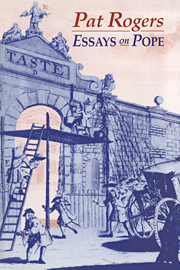Book contents
- Frontmatter
- Contents
- Preface
- Acknowledgements
- List of abbreviations
- 1 Pope and the syntax of satire
- 2 The politics of style
- 3 Form and pattern in the Pastorals
- 4 Windsor-Forest, Britannia and river poetry
- 5 Faery lore and The Rape of the Lock
- 6 Timon's Villa and Chatsworth
- 7 A drama of mixed feelings: the Epistle to Arbuthnot
- 8 The name and nature of Dulness: proper nouns in The Dunciad
- 9 Pope and the social scene
- 10 Blacks and poetry and Pope
- 11 The case of Pope v. Curll
- 12 Pope and his subscribers
- 13 The Burlington circle in the provinces: Pope's Yorkshire friends
- 14 Pope and the antiquarians
- Index
1 - Pope and the syntax of satire
Published online by Cambridge University Press: 18 December 2009
- Frontmatter
- Contents
- Preface
- Acknowledgements
- List of abbreviations
- 1 Pope and the syntax of satire
- 2 The politics of style
- 3 Form and pattern in the Pastorals
- 4 Windsor-Forest, Britannia and river poetry
- 5 Faery lore and The Rape of the Lock
- 6 Timon's Villa and Chatsworth
- 7 A drama of mixed feelings: the Epistle to Arbuthnot
- 8 The name and nature of Dulness: proper nouns in The Dunciad
- 9 Pope and the social scene
- 10 Blacks and poetry and Pope
- 11 The case of Pope v. Curll
- 12 Pope and his subscribers
- 13 The Burlington circle in the provinces: Pope's Yorkshire friends
- 14 Pope and the antiquarians
- Index
Summary
Spence is always invaluable. It is a shame, though, that we should have to rely on him so heavily. Anecdotes can possess charm as well as graphic immediacy, but there is a limit to the amount of serious enlightenment which they can provide. Pope must have tangled with the grammarians in his earliest youth, long before the last book of The Dunciadwas set down. Unhappily we know very little of this stage in his development. Spence cites a remark to the effect that it was the family priest (one Banister, alias Taverner) who ‘taught [him] the figures, accidence and first part of grammar’. Such nuncupatory testimony is proverbially suspect; and it would be better for this essay – which constitutes, roughly, the first part of a poetic grammar of Pope's work – if we had fuller evidence. It would be nice even to have as much to go on as in the case of Martinus Scriblerus.
Martinus, it may be recalled, sampled parts of both the trivium and the quadrivium, not to mention metaphysics and gymnastics. But in Chapter VII, where one might have expected a formal analysis of the Scriblerian trivium, rhetoric and logic are joined by metaphysics. This is a pointed substitution, and we may guess at Martinus' deficiencies from the parallel information that rhetoric, too, is passed over briefly – it has already been covered in Peri Bathous. That Martinus did learn some grammar, doubtless of a pedantic kind, we know from his association with Conradus Crambe. This was the schoolfellow carefully chosen for him by his deluded father: a word-chopper by hereditary right.
- Type
- Chapter
- Information
- Essays on Pope , pp. 1 - 26Publisher: Cambridge University PressPrint publication year: 1993

